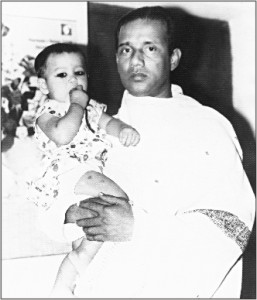 |
||||||||||||
Martyred Intellectuals From the pages of my father's diary- Roquaiya Hasina Neely The identity of the Martyred Intellectuals of 1971 - Serajul Islam Choudhury Remembering the dead, redeeming the pledge- Syed Badrul Ahsan Timeout for reflection - Shahid Alam They lived for dream, died in nightmare - Mohammad Badrul Ahsan
|
||||||||||||
From the pages of my father's diary A daughter seeks justice Roquaiya Hasina Neely My father is martyred intellectual SMA Rashidul Hasan. He was a teacher in the English department of Dhaka University. I lost him when I was only 13. Long before I could discover him as the person he was. How he was and who he was, what were his thoughts and ideologies--answers to all these questions would have remained unknown if it weren't for his meticulous diaries which my mother had held on to for so many years with great care. Over the years I have read the diaries many-many times each time and what amazes me is how a person could have led such an organized life and noted down all the works of a day with such diligence? Every event from the important ones to the ones carried out every day found its way into the pages of the diary. We were a family of five-my mother-Begum Roquaiya Rashid, father, elder brother-Mahmud Hasan, younger sister-Suraiya Amina Smreeti and me. My sister is 10 years younger to me and was very small at that time. So my mother and father had their pick, my brother being my mother's favorite and me being my father's. It was due to his wishes that I am a Tagore singer today. Being my father's favorite came with the benefit of being able to go everywhere with him. He paid attention to these little events of daily life and noted them down with care. I realize his love for all of us from this. Every morning he would wake up and read the Holy Quran sitting my little sister on his lap. He cared about all our feelings and thoughts and paid attention to them.
How much he loved his country becomes evident from his writings. He wrote on 12th march, 1969: A man who loves his country this much doesn't forget about his fellow human beings. It hurt him to see the tyranny of the powerful people over the weaker ones. How a riot at Ahmedabad in India moved him is evident from the following entry: What stands out in my father's diaries is how he had a big heart filled with love for everyone. Not only have we been deprived of our father's love but so has been the whole nation. If we had more selfless, dutiful, honest citizens like him today, our country would not have been in such a state. The Pakistanis were smart enough to understand that if these people lived no one could get in the way of Bangladesh becoming the glorious nation it dreamt of being. Thus they made a plan of crippling the nation by killing its intellectuals. And our own countrymen had helped them carry out the plan successfully. The Pakistani army did not know our fathers. The Rajakars, A1-Badar and A1-Shams helped identify them. How could we even dream of forgiving these people? They must be brought to justice. That was the end of year 1969. Bengali's had to a lot to be proud of, lot of inspiration to go on with. Now we are at the end of 2009, 37 years since our independence. What have we done to make this year memorable? Another year has passed by: still the war criminals have not been brought to justice. What resolution should we make for the coming year? At least one should include the efforts of trying to bring the war criminals to justice. I congratulate the initiatives of the Sector Commanders' forum that has come forward with the demand and hope that the initiative doesn't only remain within meeting and symposiums. I request the whole nation to come forward to help bring the criminals to justice so that my mother could see that the sacrifice of her husband was not gone in vain and that we could at least remember the next year as the year when justice will have been served. The writer is a TV artist and daughter of martyred intellectual SMA Rashidul Hasan. |
||||||||||||

 He talked as beautifully as he wrote. He was very outspoken, honest and conscious as well. He loved his country and wanted the best for it and wasn't afraid to say so either. The depth of his thoughts concerning our country and general countrymen awes me. I can imagine with what vigor and enthusiasm 21st February was celebrated in 1969 from his diary entry on that day. He noted down the speech of Mr. Abul Hashim.
He talked as beautifully as he wrote. He was very outspoken, honest and conscious as well. He loved his country and wanted the best for it and wasn't afraid to say so either. The depth of his thoughts concerning our country and general countrymen awes me. I can imagine with what vigor and enthusiasm 21st February was celebrated in 1969 from his diary entry on that day. He noted down the speech of Mr. Abul Hashim.